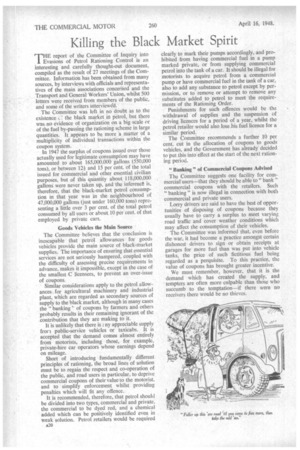Killing the Black Market Spirit
Page 22

If you've noticed an error in this article please click here to report it so we can fix it.
THE report of the Committee of Inquiry into Evasions of Petrol Rationing Control is an interesting and carefully thought-out document, compiled as the result of 27 meetings of the Committee. Information has been obtained from many sources, by interviews with officials and representatives of the main associations concefned and the Transport and General Workers' Union, whilst 500 letters were received from members of the public, and some of the writers interviewed.
The Committee was left in no doubt as to the existence i the black market in petrol, but there was no evidence of organization on a big scale or of the fuel by-passing the rationing scheme in large quantities. It appears to be more a matter of a multiplicity of individual transactions within the coupon system.
In 1947 the surplus of coupons issued over those actually used for legitimate consumption may have amounted to about 165,000.000 gallons (550,000 tons), or between 12.4 and 15 per cent, of the total issued for commercial and other essential civilian purposes, but of this quantity about 118,000,000 gallons were never taken up, and the inference is, therefore, that the black-market petrol consumption in that year was in the neighbourhood of 47,000,000 gallons (just under 160,000 tons) representing a little over 3 per cent. of the total petrol consumed by all users or about 10 per cent. of that employed by private cars.
Goods Vehicles the Main Source The Committee believes that the conclusion is inescapable that petrol allowances for goods vehicles provide the main source of black-market supplies. The importance of ensuring that essential services are not seriously hampered, coupled with the difficulty of assessing precise requirements in advance, makes it impossible, except in the case of the smallest C licensees, to prevent an over-issue of coupons.
Similar considerations apply to the petrol allowances for agricultural machinery and industrial plant, which are regarded as secondary sources of supply to the black market, although in many cases the "banking of coupons by farmers and others probably results in their remaining ignorant of the contribution that they are making to it.
It is unlikely that there is cny appreciable supply fron public-service vehicles or taxicabs. It is accepted that the demand comes almost entirely from motorists, including those, for example, private-hire car operators whose earnings depend on mileage.
Short of introducing fundamentally different principles of rationing, the broad lines of solution must be to regain the respect and co-operation of the public, and road users in particular, to deprive commercial coupons of their value to the motorist, and to simplify enforcement whilst providing penalties which will fit any offence.
It is recommended, therefore, that petrol should be divided into two types, commercial and private. the commercial to be dyed red, and a chemical added which can be positively identified even in weak solution. Petrol retailers would be required A20 clearly to mark their pumps accordingly, and prohibited from having commercial fuel in a pump marked private, or from supplying commercial petrol into the tank of a car. It should be illegal for motorists to acquire petrol from a commercial pump or have commercial fuel in the tank of a car, also to add any substance to petrol except by permission, or to remove or attempt to remove any substitutes added to petrol to meet the requirements of the Rationing Order.
Punishments for such offences would be the withdrawal of supplies and the suspension of driving licences for a period of a year, whilst the petrol retailer would also lose his fuel licence for a similar period.
The Committee recommends a further 10 per cent. cut in the allocation of coupons to goods vehicles, and the Government has already decided to put this into effect at the start of the next rationing period.
" Banking " of Commercial Coupons Advised The Committee suggests one facility for commercial users—that they should be able to " bank" commercial coupons with the retailers. Such " banking " is now illegal in connection with both commercial and private users.
Lorry drivers are said to have the best of opportunities of disposing of coupons because they usually have to carry a surplus to meet varying road traffic and cover weather conditions which may affect the consumption of their vehicles.
The Committee was informed that, even before the war, it had become a practice amongst certain dishonest drivers to sign or obtain receipts at garages for more fuel than was put into vehicle tanks, the price of such fictitious fuel being regarded as a perquisite. To this practice, the value of coupons has brought greater incentive.
We must remember, however, that it is the demand which has created the supply, and tempters are often more culpable than those who succumb to the temptation—if there were no receivers there would be no thieves.












































































